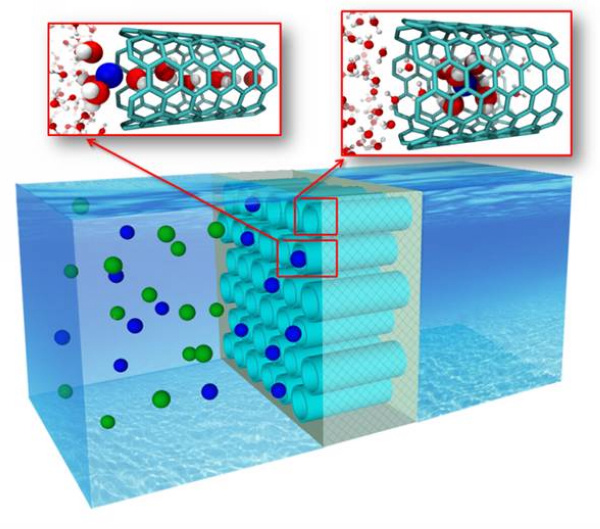Blockage of Water Flow in CNTs by Ions with New Lights along CNT-Based Water Desalination
Seawater desalination is one of the major methods to solve the water crisis. Even the desalination technologies have been commercialized now, unfortunately, those technologies are still too expensive and inefficient. Filtering nanotechnology based on nanotube is believed to be a potential approach in producing clean and affordable water. Along with this direction, great efforts have been made in the past ten years including that an ultrafast water flow rate through carbon nanotube (CNT) has been actually observed by experiment since 2005 and numerical simulations have shown that CNT is capable of rejecting ions while allowing fast water flow. However, up to now, there is still no experiment demonstrating that the CNT is adequate for desalination even though the fabrication technology of CNT membranes has been greatly improved.
Recently, Dr. Jian Liu, Dr. Guosheng Shi, Prof. Haiping Fang and other scientists at SINAP show that water flow in CNT will be blocked by cations in solutions since cations are bound at the entrance or trapped in the interior of the CNT by combining classical simulations with density functional theory calculations. The key to this behavior is the strong non-covalent interactions between cations in solution and aromatic rings in CNT. Based on this understanding, new methods are proposed to prevent blocking of CNT by ions while allowing ultrafast water flow with ion rejection. These findings provide new insight for the CNT-based water desalination and purification, individual ions detecting and ions selective transporting. The results have been published in Physical Review Letters (PRL 115, 164502 (2015)). This work has been specially reported as a research in Chemistry World with a title “Nanotube desalination could be put back on track”.

Figure 1: Blockage of water flow in carbon nanotubes by ions due to interactions between cations and aromatic rings
This work is supported by Chinese Academy of Sciences, National Natural Science Foundation of China, Shanghai Natural Science Foundation of China, the Computer Network Information Center of Chinese Academy of Sciences and the Shanghai Supercomputer Center of China.

Contact
Fang Haiping
Shanghai Institute of Applied Physics(SINAP),CAS
E-mail: fanghaiping@sinap.ac.cn 
